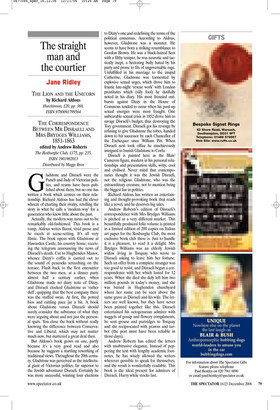The straight man and the courtier
Jane Ridley
THE LION AND THE UNICORN by Richard Aldous Hutchinson, £20, pp. 368, ISBN 9780091799564 THE CORRESPONDENCE BETWEEN MR DISRAELI AND MRS BRYDGES WILLIAMS, 1851-1863 edited by Andrew Roberts The Roxburghe Club, £175, pp. 235, ISBN 1901902013 Distributed by Maggs Bros Gladstone and Disraeli were the Punch and Judy of Victorian politics, and reams have been published about them, but no one has written a book which centres on their relationship. Richard Aldous has had the clever wheeze of charting their rivalry, retelling the story in what he calls a ‘modern way’ for a generation who know little about the past.
Actually, the modern way turns out to be remarkably old-fashioned. This book is a romp. Aldous writes fluent, vivid prose and he excels at scene-setting. It’s all very filmic. The book opens with Gladstone at Hawarden Castle, his country home, receiving the telegram announcing the news of Disraeli’s death. Cut to Hughenden Manor, whence Dizzy’s coffin is carried out to the sound of peacocks screeching on the terrace. Flash back to the first encounter between the two men, at a dinner party almost half a century earlier, when Gladstone made no diary note of Dizzy, and Disraeli clocked Gladstone as ‘rather dull’, quipping that the best company there was the stuffed swan. At first, the potted bios and rattling pace jar a bit. A book about Gladstone versus Disraeli should surely consider the substance of what they were arguing about and not just the personal spats. You close the book without really knowing the difference between Conservative and Liberal, which may not matter much now, but mattered a great deal then.
But Aldous’s book grows on one, partly because it’s a very good read and also because he suggests a startling reworking of traditional views. Throughout the 20th century, Gladstone was perceived as the intellectual giant of Victorian politics, far superior to the Jewish adventurer Disraeli. Certainly he was more successful, winning four elections to Dizzy’s one and redefining the terms of the political consensus. According to Aldous, however, Gladstone was a monster. He seems to have born a striking resemblance to Gordon Brown. He was a black-haired Scot with a filthy temper, he was neurotic and tactically inept, a hectoring bully hated by his party and prone to fits of ungovernable rage. Unfulfilled in his marriage to the insipid Catherine, Gladstone was tormented by explosive sexual urges, which drove him to frantic late-night ‘rescue work’ with London prostitutes which (silly fool) he dutifully noted in his diary. His most frenzied outbursts against Dizzy in the House of Commons tended to occur when his pent-up sexual energies were most fraught. One unbearable sexual crisis in 1852 drove him to savage Disraeli’s budget, thus destroying the Tory government. Disraeli got his revenge by refusing to give Gladstone the robes, handed down to his successor by each Chancellor of the Exchequer since William Pitt. When Disraeli next took office he mischievously intrigued to banish Gladstone to Corfu.
Disraeli is painted here as the Blair/ Cameron figure, modern in his personal relationships and presentation skills, witty, cool and civilised. Never mind that contemporaries thought it was the Jewish Disraeli, not the religious Gladstone, who was the extraordinary creature, not to mention being the biggest liar in politics.
Richard Aldous has written an entertaining and thought-provoking book that reads like a novel, and he deserves big sales.
Andrew Roberts’s edition of Disraeli’s correspondence with Mrs Brydges Williams is pitched at a very different market. This beautifully produced folio volume is printed in a limited edition of 200 copies on Italian art paper for the Roxburghe Club, the most exclusive book club there is. Just to handle it is a pleasure, to read it a delight. Mrs Brydges Williams was an elderly Jewish widow living in Torquay who wrote to Disraeli asking to leave him her fortune. Such an offer from a complete stranger was too good to resist, and Disraeli began a correspondence with her which lasted for 12 years. When she died she duly left him two million pounds in today’s money, and she was buried in Hughenden churchyard where her name can be seen above the same grave as Disraeli and his wife. The letters are well known, but they have never been printed together like this. Disraeli entertained his octogenarian admirer with nuggets of gossip and flowery compliments, he sent grouse and partridges to Torquay and she reciprocated with prawns and turbot (the post must have been reliable in those days).
Andrew Roberts has edited the letters with unobtrusive elegance. Instead of peppering the text with lengthy academic footnotes, he has wisely allowed the writers wherever possible to speak for themselves, and the result is wonderfully readable. This book is the ideal present for admirers of Disraeli. Hurry while stocks last.






































































































































 Previous page
Previous page